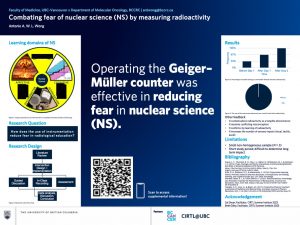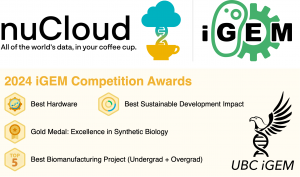International Genetically Engineered Machine (iGEM)
In terms of undergraduate research experience, UBC iGEM elevates from “what is the right answer?” to “what does the world need from science?” Appointed as instructor, UBC iGEM is a interdisciplinary, undergraduate-level design team in synthetic biology to solve real world problems. This year, the team proposed nuCloud as a platform technology to scalably store digital information in the zettabyte era using engineered terminal transferase on functionalized glass. Inspired by nature, the team aimed to extend DNA as a biological hereditary information medium to a read and writeable digital storage system. The prototype and findings won the following awards in iGEM Competition 2024 in Paris, France:
- Best Hardware
- Best Sustainable Development Project
- Gold Medal: Excellence in Synthetic Biology
- Best Biomanufacturing Project (Undergrad + Overgrad): Top 5 nomination
To demonstrate the ambition of this project, many companies (e.g. BioMemory, DNAScript, TwistBioscience) are actively working on this concept; building upon their successes among 26 undergraduates demands a collaborative, consultative and holistic approach, with a robust grasp of academic project management. My task was to execute these approaches and train students to have 1) the necessary skills to surmount the research question, and 2) scientific leadership to manage lab workflow, personnel and resources. What I found rewarding was the improvement of technical (chemical + biological) and inquisitive skills of my trainees. Over time, their questions improved from, what reagents to use (basic understanding of experimental setup), to what temperature and concentration ranges to try in order to comply with hardware constraints in consultation with the engineering team (logistics of optimization). I oversaw the fostering of metacognition, the realization of interconnectedness of interdisciplinary knowledge. As intellectual preparedness improved, the efficiency of lab meetings and quality of data presented measured up to graduate level standards.
Scholarship of Teaching and Learning (SoTL)
If a strawberry is irradiated by a radiation source, can I still eat it?

High resolution format is available here, and its supplemental information is available here.
Scientific Outreach
3rd year Science Communication students (UBC SCIE300) covered my first author publication on Thymidine analogs for positron emission tomography. I am quite impressed with what they managed to convey for a general population audience.
Chemistry for Cancer: New Radioactive Tracers for Cancer Diagnosis


